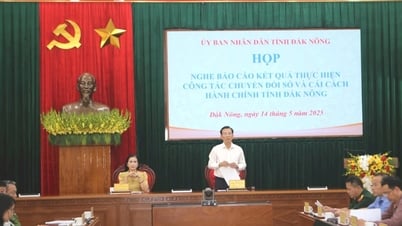On the afternoon of May 14, Minister of Finance Nguyen Van Thang presented the draft Law on State Budget (amended). According to the Minister, the draft Law has many comprehensive and systematic amendments. The content of the amendment to the Law on State Budget this time includes 13 major groups of issues and 14 new additional contents, demonstrating the update and synchronization with related laws such as the Law on Public Investment, the Law on Investment under the Public-Private Partnership (PPP) method, and the Law on Public Debt Management.

Specifically, the regulation on outstanding loans of local governments is reduced from 3 local groups to 2 local groups and the outstanding loan amount is increased compared to current regulations. The draft adds the principle of prioritizing the allocation of state budget expenditures for the development of science, technology, innovation and digital transformation.
At the same time, it stipulates a number of additional state budget expenditure tasks arranged from two sources (public investment expenditure and regular expenditure), including: Compensation, support, resettlement, site clearance; costs of preparing and approving public investment projects using ODA capital and preferential loans from foreign donors; preparation, appraisal and approval of pre-feasibility study reports, investment proposal reports; preparation, appraisal and decision on project investment, and planning activities.
Regarding the reserve budget, the draft increases the reserve allocation from 2% to 5%; adds regulations on the scope of spending from reserve sources for supplementary national reserve spending; urgent and extraordinary foreign affairs tasks of the state; and shares the revenue reduction for investment projects under the public-private partnership (PPP) method. The time for repaying advances to the Financial Reserve Fund is increased to 12 months from the date of advance payment.
In particular, the draft has revised and supplemented the basis for making state budget estimates to ensure full coverage of revenue sources and revised and supplemented to clarify the requirements for making regular expenditure estimates.
Minister Nguyen Van Thang said that in order to continue promoting decentralization and delegation of power, the draft stipulates the authority of the National Assembly and People's Councils at all levels in localities to decide on the State budget expenditure estimates, detailed according to development investment expenditures and regular expenditures, but not to decide in detail on the fields of education - training, vocational training, science, technology, innovation and digital transformation; to decide on budget allocation for ministries, central agencies, agencies, units and localities, detailed according to development investment expenditures and regular expenditures.
The draft also stipulates the Government's authority to adjust the revenue and expenditure estimates of a number of ministries, central agencies and a number of localities (currently under the National Assembly Standing Committee); adjust the deficit and local government debt levels decided by the National Assembly within the scope of the State budget deficit (currently under the National Assembly).
At the same time, supplement regulations on the duties and powers of Ministers, heads of ministerial-level agencies, government agencies and other central agencies, and heads of budget estimate units regarding accountability related to the preparation, allocation, administration and settlement of the State budget when requested.
Provincial People's Councils are allowed to issue a number of fees and charges outside the list prescribed by the Law on Fees and Charges; decide on budget expenditure regimes for a number of social security expenditure tasks, local regimes and policies. Commune People's Councils are allowed to issue policies and regimes suitable to the actual situation in the locality. People's Committees are allowed to adjust local budget estimates (currently under the Standing Committee of the People's Council); are responsible for explaining to competent authorities when requested.
Regarding the state budget settlement process, the draft Law has simplified and reduced procedures including: inspection process and content, settlement approval procedures of financial agencies and level 1 budget units; eliminated the settlement appraisal procedure of higher-level financial agencies for directly subordinate budgets at the local level.
Accordingly, the Draft Law on State Budget (amended) will define responsibilities and powers between the central and local levels, associated with the rights and responsibilities of each level in implementing state budget revenue and expenditure according to the motto "whichever level implements most effectively and promptly will be assigned to that level to implement"; "locality decides, locality does, locality is responsible"./.
Source: https://baodaknong.vn/day-manh-phan-cap-phan-quyen-trong-thu-va-chi-ngan-sach-nha-nuoc-252548.html







![[Photo] Prime Minister Pham Minh Chinh chairs conference on anti-smuggling, trade fraud, and counterfeit goods](https://vphoto.vietnam.vn/thumb/1200x675/vietnam/resource/IMAGE/2025/5/14/6cd67667e99e4248b7d4f587fd21e37c)
















































































Comment (0)